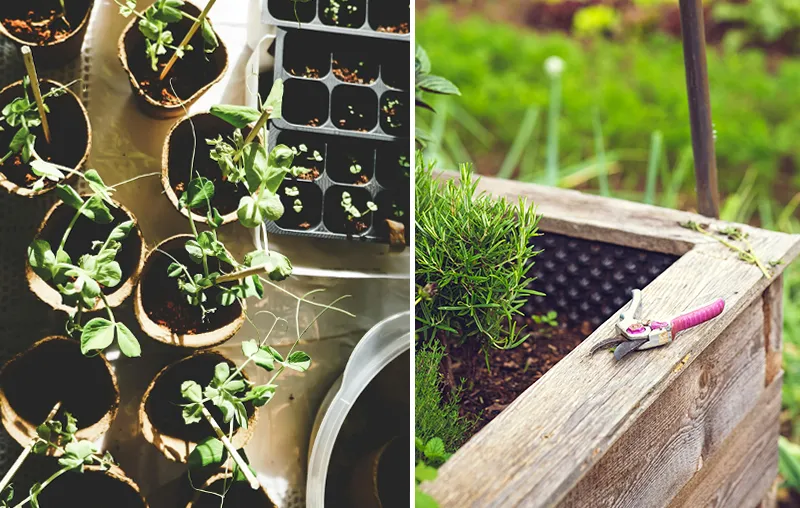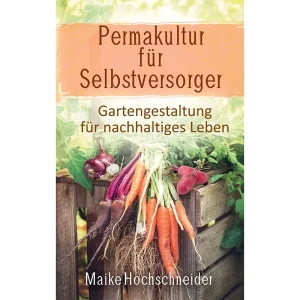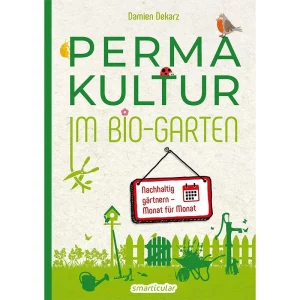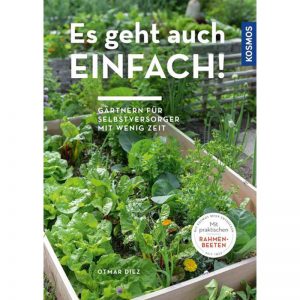Do you want to garden as cheaply as possible and create a beautiful garden without spending a fortune? Then you've come to the right place! Garden trees, seeds, garden tools, fertilizers, planters, decorations, garden furniture, irrigation and, last but not least, the entire planning and design by a professional gardening and landscaping company can cost quite a lot of money.
But many of us only have a small budget for these things. Fortunately, there are many simple ways to save money in the garden without having to sacrifice personal wishes.
In this article, I would like to introduce you to effective tips that you can use to design and maintain your garden cost-effectively as a hobby gardener. From the smart procurement of new plants to the environmentally friendly use of your resources. Let's go!
12 tips: How to get cheap plants for the garden?
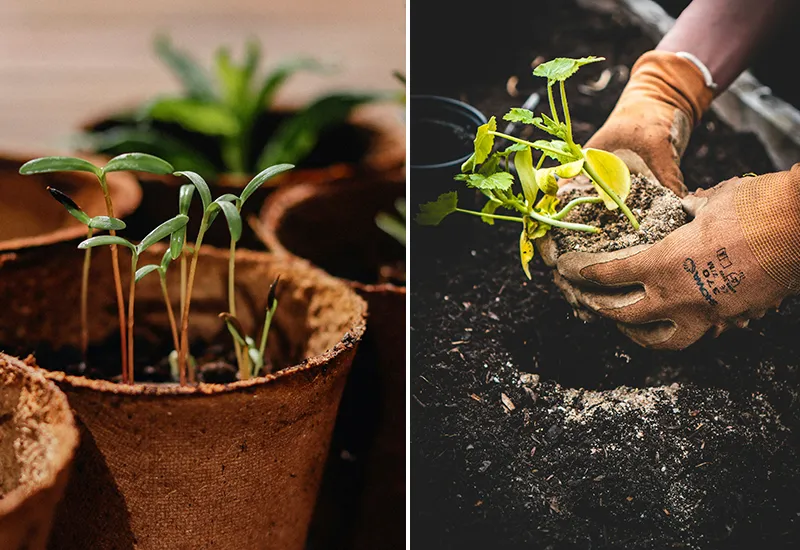
I personally try to keep my Making the garden as sustainable as possible - and also my personal contribution in the fight against environmental problems such as Climate Change and the Species Extinction to perform.
But I also know that a garden requires some patience . Mainly because I don't have the necessary money on "the high edge". However, thanks to a few tips and tricks, I can still realize many of my wishes sooner than I thought.
I would like to show you which ones in the following. First, I'll explain how you can get plants for your garden at a reasonable price, before IHere are a few more general tips for saving money in the garden ready for you.
1. provide precise information about the preferred plants
... and avoid costly bad purchases.
Do you want to garden cheaply? Then be aware of this before you buy your plants, which claims your favorite trees, shrubs and flowers, why you want them in your garden and how much they cost.
Here are some Things to bear in mind:
- Location (e.g. sun or partial shade)
- Floor (e.g. nutrient-poor or nutrient-rich)
- Ecology (e.g. insect and bird friendliness or possible invasiveness)
- Growth (e.g. height, width and density)
- Origin (e.g. native or foreign)
- Alternatives (e.g. for a favorite plant that is generally very expensive)
2. visit public plant flea markets in the region
... to get cheap plants and seeds that others no longer need.
Be sure to visit Local plant flea markets and swap meetsto find real "bargains". You can often find garden plants at low prices and also get in touch with other (hobby) gardeners.
3. get new plants from the neighbor's garden
... and benefit from the neighborly community free of charge.
It's a complete waste of money if all your neighbors buy all their own plants! Living together, on the other hand, can save you all a lot of money in the garden. So talk to each other and swap plants and seeds so that everyone benefits from each other and also promotes a sense of community.
4. sow near-natural wildflower mixtures
... which are inexpensive, insect-friendly, beautiful and undemanding.
Wildflowers are extremely easy to care for (see also low-maintenance garden) and inexpensive or even free to purchase. So even if you have a small budget for a beautiful, lively and colorful garden create new habitat and food for many insects and other garden animals and help the Counteracting species extinction.
Tip: How to create an insect-friendly Wildflower meadow in the garden is explained in detail in the linked blog post.
5. buy bare root plants instead of potted plants
... and save money compared to expensive container or bale goods.
If a plant is "bare-rooted", then it does not have a root ball, like conventional goods from the plant market that you buy in a pot. Instead, they are naked at the roots. So that they adapt quickly, they must be planted as soon as possible after purchase. They also have a slightly lower, but still very high, probability of growing.
Fortunately, for these reasons, the healthy plants are really good value for money. If you want to garden cheaply, you should simply make a conscious effort to buy bare-root plants when browsing for garden plants.
6. buy plants at a favorable time
... and benefit from seasonal price advantages.
Buy plants in the months of the year when they are no longer in high demand. Outside the main season many garden centers offer you huge discounts. Especially for plants that are disappearing from the range and have to be sold off.
In addition, many nurseries and plant stores have a kind of "Residual ramp". There you will usually find real plant bargains that will thrive again with a little care.
Important: If you have something for the Biodiversity in nature and save species, then you should always take a look at the ecological characteristics (e.g. is the plant native, wild bee-friendly, insect-friendly and bird-friendly?
7. grow plants from vegetable scraps
... and give kitchen waste a new life free of charge.
Just try the trend called "Regrowing"if you want to get new plants and food for free.
To do this, simply place the stalk of the leek, romaine lettuce or celery in a Water glassuntil the sprouts develop and you can use the plant again. So you can Utilize leftovers and let it grow again - at no cost!
8. propagate garden plants yourself by division
... and save a lot of costs over time.
If you want to save money on your garden beds, I have another valuable tip for you! Especially perennials and grasses can be divided into several cuttings after they have grown well by simply cutting them off with a spade.
This way, you can increase the number of plants in your own garden at no cost at all. And it gets even better: you can even repot plants you don't need and sell for a profit at local plant swap meets and flea markets - and reinvest the money in your garden.
9. buy plants (and objects) via classified ads
... to get them cheaply or even for free.
Be sure to look for classified ads in the newspaper and online to inexpensive or even free of charge plants or things for the garden. From trees, perennials, grasses and flowers, to dead wood, field stones, a wheelbarrow and a garden bench, to useful gardening books, you'll find everything there!
10. buy flower bulbs in late fall
... and benefit from seasonal bargain prices.
From November at the latest, flower bulbs are sold in garden centers at significantly lower prices, as the Tubers do not keep forever are. Take advantage of this if you want to garden as cheaply as possible.
11. obtaining your own seeds and sowing plants yourself
... and promote (financial) independence.
Seeds are of course much cheaper to buythan the already grown plant in the pot. But it's also completely free! Simply obtain your own seeds from existing plants, for example. Vegetable plants, summer flowers and perennials.
This way you can once again save money in the garden. You also enjoy full control over your plants while you more independent from seed suppliers do.
12. rely on perennial plants
... to avoid having to buy expensive new ones all the time.
"Annuals" are plants that within one growing season germinate, ripen, flower and eventually die. So they have to be bought again and again or at least reseeded. Expensive fun.
If you have a tighter budget for your garden, you should instead invest in perennial plants (that are at least three years old or never expire). They grow and flower for a very long time, so you don't have to keep buying new ones. This saves you money and effort.
7 more tips: How else can you garden cheaply and save money?
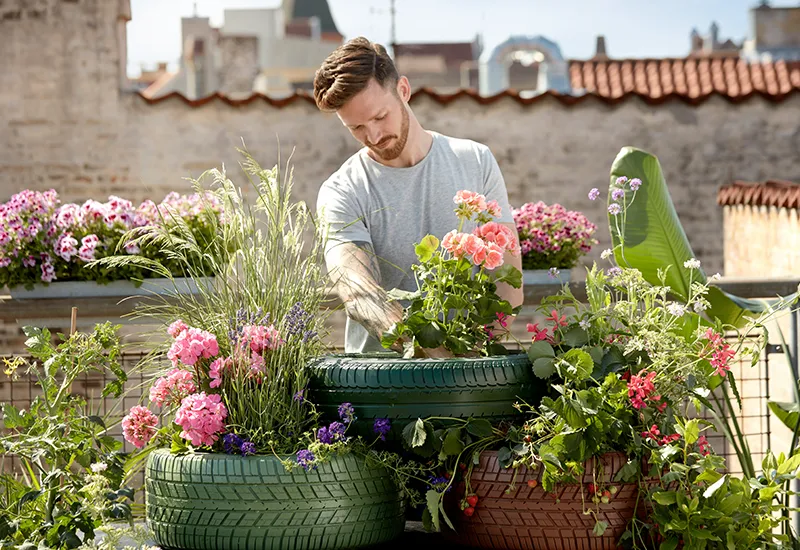
Now you know how to save money on your garden plants! But the garden isn't just about plants! And that's why I have of course Some more tips for hobby gardeners to save money and savers that you can use!
13. collect rainwater with a barrel
... and water the garden with free water from nature.
When it rains, the sky gives you water to irrigate your plants! With an underground Cistern or a rain barrel (e.g. a converted old wine barrel), you can also easily collect rainwater from the roof of your house or garden shed.
You can then use it if required instead of water from the outside tap. This way you can save a lot of money and of course a lot of Saving water in the garden.
14. purchase only necessary and high-quality garden tools
... to avoid buying it twice and three times.
Buy cheap, buy twice! It's better to buy high-quality, durable gardening tools and only the things you really need for low-cost gardening! You'll save a lot of money in the long run.
To a good basic equipment include the following things:
- Spades, shovel, rake, hoe and rake
- Secateurs and garden knives
- Planting trowel, buckets and pots
- Stepladder, wheelbarrow and watering can
- A quiet cylinder lawn mower (my recommendation*)
15. get rid of pests with the help of natural enemies
... to avoid having to buy expensive pesticides.
Even if many (hobby) gardeners don't pay much attention to them in the garden, there are some garden animals that you can usefully bring in for free, natural pest control can be used.
So are Ladybugs, hoverflies and Lacewings natural predators of aphids, for example. With their help, there is no need to purchase expensive, chemical (environmentally harmful) products.
All you have to do is tell them offer enough food. Ladybugs, for example, pay for the investment in Dill, garlic, cornflower or yarrow in the form of their work!
16. upcycling old objects
... to use existing items in a new function free of charge.
Upcycling transforms an inconspicuous garden into an attractive Creative paradise with a personal touch.
Old car tires, pots, teapots and crates serve as unique planters, for example. And from a few used Euro pallets you can conjure up a large, inexpensive bee hotel in just a few steps, creating a new habitat for insects in your garden.
Additional tips: Apart from the upcycling ideas, you can also use free natural stones from the field (ask a farmer in your area) instead of expensive natural stones for walls and walkways. And you can get dead wood as decoration or climbing support from the forestry office on request.
17. build a children's playground from garden material
... to give natural material from the garden an educational value.
We Adults can learn a lot from our children! The kids, for example, are bursting with imagination and also enjoy the little things in life. That's why you don't necessarily need an expensive tree house and swing in the garden.
For example, you can give them a few seeds and help them grow their Your own bed to try out create. With tall shrubs and Cairn you can economically create great Hiding places. An old, fallen deadwood tree trunk (ask your trusted forester again!) for balancing could round off the play paradise.
18. buy garden furniture out of season
... to save money when everyone else is in hibernation.
Prices for garden tables and the like fall as the garden season draws to a close. In late summer, but especially in fallLogically, the demand for garden furniture is then relatively low, so you can benefit from massively reduced offers and get it for a fraction of the original price.
19. composting or collecting compost from the local composting plant
... and get fertile compost for free.
Everyone should create a compost heap. And if you have a limited budget and want to garden sparingly, then even more so! Because you can use it to turn kitchen and garden waste into Free, fertile soil and valuable, natural fertilizer convert. This will ultimately save you a lot of money on compost and plant fertilizer.
And if you can't or don't want to compost, then simply get with a borrowed trailer Compost from a local composting plant. This is always available at very low cost - and often even completely free of charge.
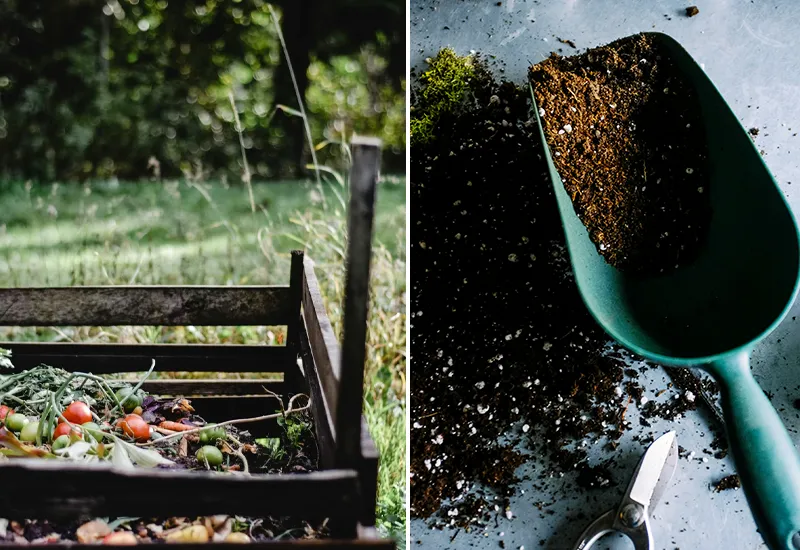
Inexpensive gardening, made easy!
Have you always thought that it is difficult to create a beautiful, species-rich garden paradise for little money? Then you can now bury this belief once and for all. Because with this article you have got to know countless tips that prove the opposite - from plant flea markets, classified ads and propagation, to upcycling and self-produced compost.
Simply implement them one by one and use them to make your garden more natural and beautiful in the future, while at the same time save money sustainably.
"Change is necessary like the renewal of leaves in spring."
Vincent van Gogh (more at Garden Quotes)
I hope that I have been able to inspire you with these practical tips for low-cost gardening. Do you have any questions, suggestions or other ideas for better cost efficiency in your own green space? Then I look forward to your comment!
Stay environmentally and price-conscious,

PS: Although a garden shed is one of the more expensive purchases in the garden, it can be a real highlight. My best Garden shed ideas have been compiled in the linked article. Have a look there too!

